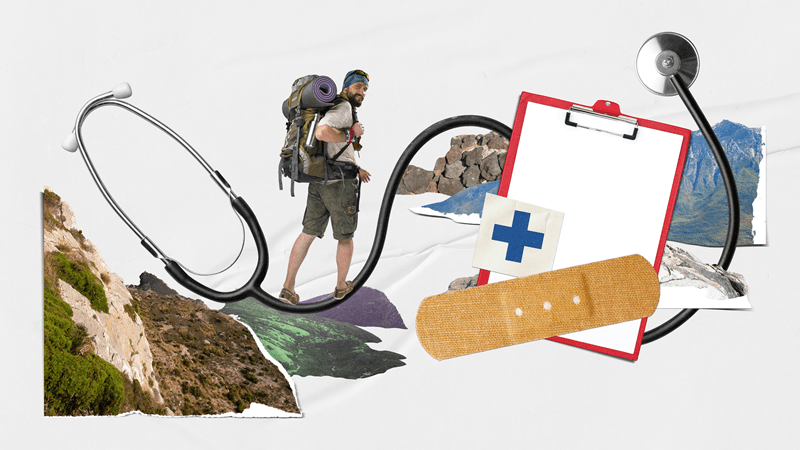Why Travel Insurance is a Must for 2024 U.S. Road Trips
Why Travel Insurance is a Must for 2024 U.S. Road Trips


Planning a road trip across the United States can be one of the most exhilarating ways to explore the diverse landscapes and vibrant cultures of this vast country. Whether you're cruising along the Pacific Coast Highway, traversing the historic Route 66, or venturing into the majestic National Parks, the freedom of the open road is unmatched. However, amidst the excitement of adventure lies the unpredictability of travel. This is where travel insurance for U.S. road trips comes into play, providing a safety net to ensure that your journey remains enjoyable and stress-free.
In 2024, as road trips gain popularity once again, understanding the importance of domestic travel protection becomes essential. Here, we delve into the various aspects of travel insurance, focusing on why it's indispensable for your road trips, covering everything from trip cancellation coverage to emergency medical insurance and road trip safety.
The Rise of Road Trips in 2024
After the disruptions caused by the global pandemic, many travelers are gravitating towards road trips as a safer alternative to international travel. The sense of control over one’s environment and the ability to maintain social distance are just a couple of reasons that contribute to the resurgence of this travel trend. According to recent surveys, road trips are projected to be one of the top travel methods for 2024, with millions of families and individuals hitting the highways.
While the flexibility and freedom that road trips offer are appealing, they also require meticulous planning. From deciding on routes to budgeting for gas and accommodations, travelers must ensure they are prepared for any scenario. One of the most vital yet often overlooked aspects of this preparation is securing travel insurance.
Why Travel Insurance is Essential

1. Protection Against Unforeseen Circumstances
Road trips are inherently unpredictable. Weather conditions can change in an instant, vehicle breakdowns can occur, and emergencies can arise. Travel insurance acts as a safety net that provides financial protection against unforeseen circumstances. If you must cancel or delay your trip due to unexpected events like extreme weather, illness, or family emergencies, trip cancellation coverage ensures you can recoup non-refundable expenses.
Example:
Imagine you’ve planned a week-long road trip to the Grand Canyon, but a sudden storm forces you to cancel. With trip cancellation coverage, you can recover costs associated with your accommodations and pre-paid activities.
2. Emergency Medical Insurance
One of the primary reasons to consider travel insurance for U.S. road trips is the potential for medical emergencies. While many people have health insurance, it may not cover you adequately when traveling out of your home state. Emergency medical insurance can help pay for hospital visits, ambulance services, and other medical expenses incurred while on the road.
Example:
If you find yourself needing medical attention after a minor accident during your trip, emergency medical insurance can alleviate the financial burden of unexpected healthcare costs. This coverage is crucial, especially for road trips that venture into remote areas where medical facilities may be limited.
3. Road Trip Safety: Vehicle Coverage
Most travel insurance policies also provide coverage related to vehicle issues. If your vehicle breaks down, becomes damaged, or is involved in an accident, travel insurance can assist with roadside assistance services and other expenses related to vehicle repair or replacement.
Example:
Suppose you’re driving through the picturesque landscapes of Colorado and your car breaks down in a remote area. With travel insurance that includes roadside assistance, you can quickly get help, ensuring your trip can continue with minimal disruption.
4. Baggage Protection
On a road trip, your vehicle is your primary mode of transportation, but it’s also your storage space for personal belongings. If your luggage gets lost, damaged, or stolen during your journey, baggage protection can provide compensation for lost items. This coverage extends to valuable items such as electronics, clothing, and personal items essential for your trip.
Example:
If you stop for a meal and inadvertently leave your camera in the restaurant, travel insurance can help you recover the cost of that lost item, ensuring your budget remains intact.
5. Covers Trip Interruptions
Plans can change rapidly, and sometimes you may need to cut your road trip short. Travel insurance often includes trip interruption coverage, which can reimburse you for the unused portions of your trip if you need to return home early due to a covered reason.
Example:
Suppose a family emergency arises that requires you to leave your trip abruptly. Trip interruption coverage ensures that you won’t lose money on the non-refundable bookings you made for the rest of your journey.
6. Peace of Mind
Perhaps the most significant benefit of travel insurance is the peace of mind it provides. Knowing that you have protection against unexpected events allows you to focus on the adventure rather than worrying about what could go wrong. This mental clarity can enhance your travel experience and make your road trip all the more enjoyable.
7. Affordability of Travel Insurance
Many travelers mistakenly believe that travel insurance is too expensive, but this is often not the case. The cost of travel insurance is typically a small fraction of your overall trip expenses. Considering the potential financial losses incurred from unexpected cancellations, medical emergencies, or trip interruptions, investing in travel insurance is a smart choice.
8. Choosing the Right Policy
When selecting a travel insurance policy for your road trip, consider the following factors:
- Coverage Amount: Ensure that the policy covers enough for your needs, including trip cancellation, medical expenses, and vehicle coverage.
- Exclusions: Read the fine print to understand what is and isn’t covered. Some policies may exclude pre-existing medical conditions, so be sure to clarify these details.
- Customer Reviews: Research the insurance provider’s reputation by reading customer reviews. A reliable company will have a history of excellent customer service and claim support.
How to Make the Most of Your Travel Insurance
Once you have secured your travel insurance for your U.S. road trip, here are some tips to ensure you maximize its benefits:
1. Know Your Policy Details
Before hitting the road, familiarize yourself with your policy details. Understand the coverage limits, exclusions, and the process for filing a claim. This knowledge will empower you to navigate potential challenges more effectively.
2. Keep Documents Handy
Maintain a digital and physical copy of your travel insurance documents. Having easy access to this information will be crucial in case of emergencies. Many insurance providers offer mobile apps that allow you to view your policy details and contact customer service directly.
3. Document Everything
If you encounter any issues during your road trip, document the details. Take pictures, keep receipts, and write down descriptions of events. This information will be invaluable when filing a claim and can help expedite the process.
4. Contact Your Insurance Provider
If you face a situation that requires you to use your travel insurance, contact your insurance provider as soon as possible. They can guide you through the claims process and advise you on what to do next.
5. Stay Informed
Stay updated on travel advisories, weather forecasts, and local news in the areas you plan to visit. Awareness of your surroundings can help you avoid potential risks and make informed decisions about your journey.
Conclusion
As road trips continue to be a popular travel choice in 2024, ensuring you have adequate domestic travel protection is essential for a successful and worry-free adventure. Travel insurance provides a comprehensive safety net that protects against various risks, including trip cancellations, medical emergencies, vehicle issues, and more.
Investing in travel insurance for your U.S. road trips is not just about protecting your wallet; it’s about enhancing your overall travel experience. The peace of mind that comes from knowing you’re covered allows you to focus on the journey ahead—enjoying the sights, sounds, and experiences that make road trips unforgettable.
As you plan your next road trip, prioritize travel insurance in your budget and preparations. With the right coverage in place, you can embark on your adventure with confidence, knowing that you're ready for whatever the open road may bring. Whether you're traveling solo, with family, or with friends, travel insurance will ensure your journey is as smooth as the roads you'll be cruising.
This content was created by AI



